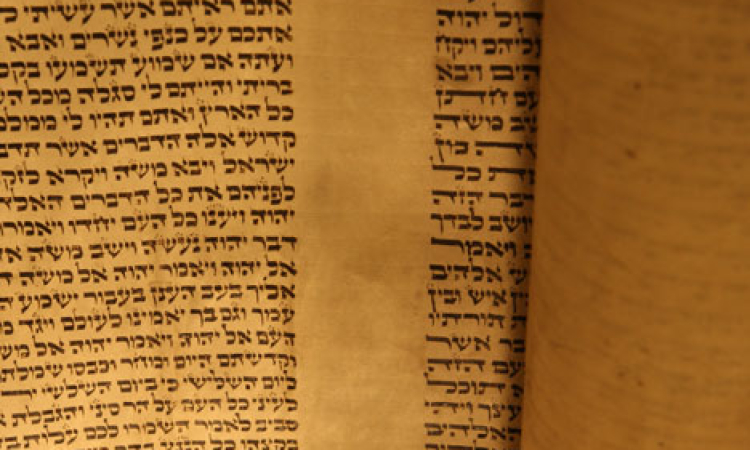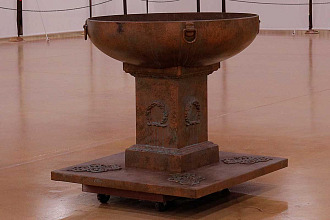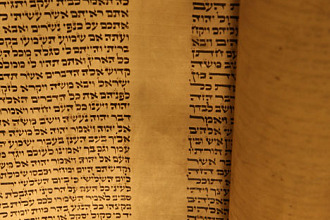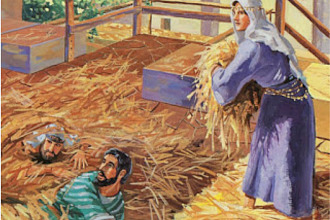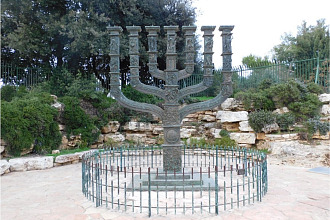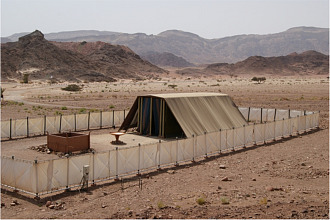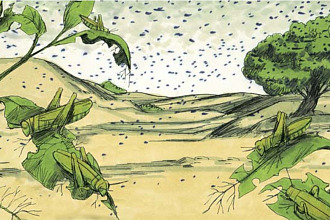Parasha for the Week: Chukat Numbers 19:1 – 22:1
Haftara for the Week: Judges 11:1 - 33
Besorat Yeshua: Mark 5:21 – 6:1
Overview
The laws of the para aduma the red heifer are detailed. These laws are for the ritual purification of one who comes into contact with death.
After nearly 40 years in the desert, Miriam dies and is buried at Kadesh.
The people complain about the loss of their water supply that until now has been provided miraculously by the Rock who followed them.
G-d commands Moses to speak to the designated Rock so that water will flow forth.
Distressed by the people’s lack of faith, Moshe hits the rock instead of speaking to it.
Therefore, G-d tells Moshe and Aharon that they will not bring the people into the Land.
The King of Edom, a descendant of Esav, denies passage through his country.
Aharon dies at Mount Hor and his son Elazar is invested with his priestly garments and responsibilities. Aharon was beloved by all, the entire nation mourns him 30 days.
Sichon the Amorite attacks Bnei Yisrael when they ask to pass through his land. As a result, Bnei Yisrael conquer the lands on the east bank of the Jordan River.
"Mitzvot are Beyond Our Logic"
Parshat Chukat begins with the mitzvah of “Parah Adumah” - “Red Heifer”. The ashes of a red heifer mixed with water were used to purify those who came into contact with a dead body. One who came in contact with a dead person became spiritually contaminated and had to go through the process of “purification.” Through the Parah Adumah, a person was transformed from a state of spiritual impurity to a state of spiritual purity.
"A Symbolic Serpent"
In the Parasha, we read: “And the people spoke against G-d and against Moshe, ‘Why have you brought us up from Egypt to die in the desert? There is no bread and no water...” “fiery serpents came among the people and they bit the people and many died.” Then G-d said to Moshe: “Make a fiery serpent, and set it upon a pole; and every one that is bitten will see it and live. And Moshe made a serpent of brass, and set it upon a pole; and if a serpent had bitten a man he would look unto the serpent of brass and he would live.” G-d wanted to teach the Jewish people that one can transform the cause of their suffering and pain (the serpent) into the source of healing by looking up; which means looking up to G-d through repentance and seeking His help. Once again this symbolic serpent referred to the Mashiach who is the one who heals and give true life. Yeshua affirmed “just as Moses lifted up the serpent in the wilderness, so must the Son of Man be lifted up, that whoever believes in him may have eternal life. For God so loved the world that he gave his only Son, so that everyone who believes in him may not perish but may have eternal life.” (John 3:14-16)
“Water Came from the Rock”
The Torah states: “the people argued with Moshe and said, Why have you brought the assembly of the L-rd into this wilderness, to die there, we and our cattle. Why did you make us come out of Egypt to bring us to this bad place. It is not a place of seed, or of figs, or of vines, or of pomegranates; neither is there any water to drink.” In response, G-d told Moshe and Aaron to gather the congregation. Moshe was told to take his staff and speak to the rock before the congregation. It would then give water. Moshe was upset with the people for constantly arguing against G-d. In anger, Moshe called out, “Hear now, you rebels...” Then, instead of speaking to the rock, Moshe hit the rock twice with his staff. The rock gave water, but Moshe and Aaron were punished for not speaking to the rock. G-d told them that as a result, they would not enter the Promised Land.
“The Smitten Rock”
It was not the first time that Moshe faced a angry people of Israel because of lack of water, in Exodus 17 we read that the Rock was already with them, giving them water “So Moses cried out to the L-RD, “What shall I do with this people? They are almost ready to stone me.” The L-RD said to Moses, “Go on ahead of the people, and take some of the elders of Israel with you; take in your hand the staff with which you struck the Nile, and go. I will be standing there in front of you on the rock at Horeb. Strike the rock, and water will come out of it, so that the people may drink.” Moses did so, in the sight of the elders of Israel.” (Ex. 17:4-6). The Bible compare this Rock to G-d, Moshe said “The Rock, his work is perfect, and all his ways are just. A faithful God, without deceit, just and upright is he” (Deut. 32:4). The Brit Hachadasha gives us a very important revelation under the pen of the Shaliach Shaul, he affirmed “and all drank the same spiritual drink. For they drank from the spiritual rock that followed them, and the rock was Mashiach.” (1 Corinthians 10:4). “The smitten rock was a figure of Mashiach, and through this symbol the most precious spiritual truths are taught. As the life-giving waters flowed from the smitten rock, so from Mashiach, ‘smitten of G-d,’ ‘wounded for our transgressions,’ ‘bruised for our iniquities’ (Isaiah 53:4, 5), the stream of salvation flows for a lost race. As the rock had been once smitten, so Mashiach was to be ‘once offered to bear the sins of many.’ (Hebrews 9:28.) Our Saviour was not to be sacrificed a second time; and it is only necessary for those who seek the blessings of His grace to ask in the name of Yeshua, pouring forth the heart’s desire in penitential prayer. Such prayer will bring before the L-rd of hosts the wounds of Yeshua, and then will flow forth afresh the life-giving blood, symbolized by the flowing of the living water for Israel.” [PP411].
HAFTARA Judges 11:1 - 33
Parasha: In the text of the parasha we have the story of Israel crossing the Negev and coming to the land of the Amonites. The Amonites attacked Israel, lost the battle and the land.
Haftara: The story in our Haftara occurred about three hundred years later, during the time of Jephthah the son of a prostitute (Judg. 11:1). The Amonites came to provoke Israel for what happened during the time of Moses. “After a time the Ammonites made war against Israel” (Judg. 11:4). The people of Israel called Jephthah to help them in this situation. Jephthah sent a delegation to the Amonites. “What is there between you and me, that you have come to me to fight in my land?” (Judg. 11:12). “But the king of the Ammonites did not heed the message that Jephthah sent him” (Judg. 11:23). Israel won the battle. It is crucial for us to know whether or not we oppose G-d’s will. Victory is in the hand of G-d, but only if we obey him.
Besorat Yeshua Mark 5:21 – 6:1
Parasha: The text of the parasha is about clean and unclean people and how they can become pure through the ritual of the Red Heifer. The rules were very strong: Everyone who touched the Red heifer or burnt it was considered unclean (Numb. 19:6-8). Everyone who touched a corpse or the body of the dead was considered unclean (Numb. 19:11-13). Even the one who cleans the unclean becomes unclean too. “It shall be a perpetual statute for them. The one who sprinkles the water for cleansing shall wash his clothes, and whoever touches the water for cleansing shall be unclean until evening.” (Numb. 19:21).
Besorah: The Besorah too is about clean and unclean people. Yeshua is called to heal a young girl who is dying. “The leader of the synagogue named Jairus came and, when he saw him, fell at his feet and begged him repeatedly, “My little daughter is at the point of death. Come and lay your hands on her, so that she may be made well, and live” (Mark 5:22-23). It was forbidden to touch a corpse. Most people did not want to touch any “almost dead” body because they were afraid to become unclean. But Yeshua is the one who cleans, purifies, and forgives everyone, that’s why he answered positively and went to see Jairus’ daughter. On his way to heal Jairus’ daughter, he met a woman who was unclean because of her hemorrhaging. She had been in this bad situation for twelve years. This lady took a great risk yet she had faith in Yeshua and decided to touch him. She took the risk of making Yeshua unclean for seven days, but her healing was more important to her and she took Yeshua’s tsitsit (tassels) in her hand. Yeshua felt it and said: “Who touched my tsitsit?” (Mark 5:30). The lady was trembling. She was afraid of the reaction of Yeshua or his talmidim, but Yeshua congratulated her faith. “Daughter, your faith has made you well; go in peace, and be healed of your disease” (Mark 5:34).

